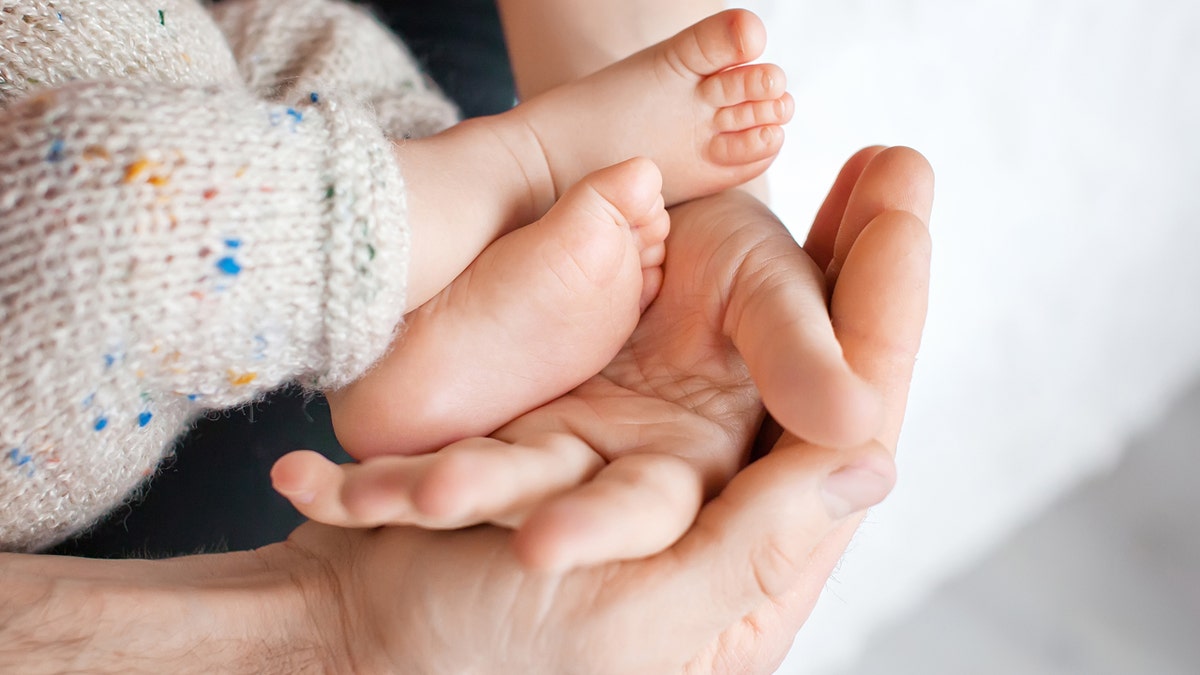
Baby feet in father hands. Tiny Newborn Baby's feet on male shaped hands closeup. Dad and his Child. Happy Family concept. (iStock)
Women aren't the only ones who may feel depressed when welcoming a newborn: a new study from New Zealand says some men also experience depression during and after their female partners' pregnancies.
In the study of almost 4,000 men, about 6 percent had elevated depression symptoms at some point during their partners' pregnancies or the nine months after the birth, researchers found.
"I think it's important for couples to be aware that either of them can be depressed and they should be seeking help and seeking support," said the study's lead author Lisa Underwood, who is affiliated with the University of Auckland.
Underwood and colleagues write in JAMA Psychiatry that 9 percent of men report depression at some point during their lives. About 3 percent report a depressive episode in the past year.
Pregnancy and childbirth may put men at an increased risk of depression, they add, though research typically focuses on women, who are at an increased risk of depression during pregnancy and after childbirth.
Still, past research also links depressed fathers to emotional and behavioral problems among children, the researchers write.
For the new study, the team analyzed data collected from the partners of women who took part in the Growing Up in New Zealand study and were due to deliver between April 2009 and March 2010.
The researchers conducted in-home interviews with 3,826 fathers during their female partners' pregnancies. Another round of interviews were conducted with 3,549 of the fathers about nine months after their children's birth.
Underwood and her colleagues found that 2.3 percent of fathers had elevated symptoms of depression while their female partners were pregnant. During the postnatal period, 4.3 percent of fathers had elevated depression symptoms after childbirth.
The men's depression symptoms during pregnancy were tied to their being stressed or in poor health. After childbirth, symptoms were more likely in men who felt stressed during the pregnancy, or were no longer in a relationship with the child's mother, men who rated their health as only fair or poor, those who were unemployed or had a history of depression.
The researchers can't say whether symptoms of depression cause poor health and other issues, or vice versa, Underwood told Reuters Health.
"It definitely points to the fact that we need to be giving couples more support," she said.
Depression should raise flags about those other health concerns, said James Paulson, a licensed clinical psychologist and associate professor at Old Dominion University in Norfolk, Virginia.
People should also think of depression's influence on the entire family, said Paulson, who wasn't involved with the new study.
"There are a lot of treatments for this," he told Reuters Health. "We've been dealing with depression for a long time. While we don't have tailored treatments for paternal depression, we do have interventions for depression and those are effective."
Those interventions include medications and psychotherapy such as cognitive behavioral therapy (CBT), which can teach people how to address issues in their life that cause or worsen depression.
"We know that either parent's mental wellbeing impacts on the other, the relationship and family," Underwood said.
Sometimes people may feel guilty seeking treatments when they just had a baby come into their lives, Paulson said.
"Consider seeking treatment for yourself as a way to treat the system that includes your child," he said.
